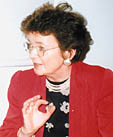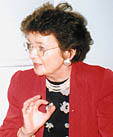
Mrs. Mary Robinson to the Yemen Times: ” Freedom of Press is an Important Part of Human Rights” [Archives:2000/07/Law & Diplomacy]
February 14 2000

Mrs. Robinson was the first Head of State to visit Rwanda in the aftermath of the genocide that took place there. She was also the first Head of State to visit the International Criminal Tribunal for the Former Yugoslavia, as well as the first Head of State to visit Somalia following the crisis in 1992. Mrs. Robinson received the Special Care Humanitarian Award in recognition of her efforts for Somalia.
Mrs. Robinson was appointed on 12 June 1997, by the Secretary-General Kofi Annan, as the United Nations High Commissioner for Human Rights. Last week she visited Sana’a and participated in the inauguration of a Workshop on the Economic, Social and Cultural Rights and the Right to Development in the Asian-Pacific Region. Mohammed Hatem Al-Qadhi, Yemen Times Managing Editor, interviewed Mrs. Robinson at the Sheraton Hotel and filed the following excerpts:
Q: You stated that there is a silver lining around human rights in Yemen. But the Amnesty International Report and other reports issued by the American Embassy in Sana’a reveal lots of human rights violations. What is your comment on that?
A: What I am saying is that there are very much two realities. However, what is really important is that there is a commitment to highlight the value of human rights and to make changes embodied in the commitment of the government on what it says. I reaffirm, as others did, that there is a great deal of work that needs to be done to address human rights problems and human rights violations, the lack of an adequate judicial system, lack of any protection system from domestic violence, discrimination against woman and many other aspects.
Q: Media and freedom of expression is one of the most important pillars of any democratic system, but in Yemen newspapers are closed down from time to time and writers get beaten and are put in prisons. For example, there is a newspaper which has been closed down for some time. So, does not this represent a violation of human rights?
A: Yes, freedom of the press is an extremely important part of human rights, and I support and have championed freedom of the press. Journalists are defenders of and strong advocates for human rights. I am very glad that there will be a Seminar held on April for journalist on human rights education and issues. Of course any repression of freedom of expression or attempt to prevent journalists from operating is a serious violation of the freedom of expression that I support from my office.
Q: You have mentioned that the result of this workshop will be streamlined in the workshop or the conference that will be held in Beijing, can you tell us about this conference?
A: What I want to emphasize is that the subject matter of this regional workshop is important. We will discuss economic and social rights and the right to development. It is important because the conclusions and practical recommendations will be considered next month at the annual workshop in China. So, we will keep the momentum of focus on economic and social rights and right to development and encourage each country in this large region to seriously take their commitment to the development of economic and social rights.
Q: What is the kind of cooperation between your commission and the NGOs working in the field of human rights?
A: When there is a technical cooperation project, part of our job is to link, support and help NGOs and civil society in education, materials, experts and giving advisory service, which shall be part of our normal work. Therefore, when we start a technical cooperation program in Yemen, it will be a normal part of our work to help them.
I participated with the NGOs this afternoon that and our office gives priority in its technical cooperation to involve and support the role of NGOs in the field of human rights. I concentrated on supporting NGOs in this field.
Q: In regards to women’s issues, you stated that the situation of women is very serious and there must be a plan to enhance their rights and education. What are your plans in this respect?
A: Our plan is to highlight and recognize that a report will be sent to CEDO Committee which will hold a convention on the elimination and discrimination against women where it will highlight these issues. So, NGOs and our office will focus on this point as the basis for advocating the need for new legislation or support. The NGOs have also made a point that in some cases the law does not discriminate but it’s rather the traditional attitudes that do. So, these shall also be addressed.
Q: What were the most important issues you discussed with President Saleh?
A: I think that it was important that I had a meeting with the President, because it shows that he appreciates the value of meeting the High Commissioner in his country. In this way he shows the government’s concern about human rights. We talked about the Human Rights Committee and the Consultative Group, and he has understood the importance of establishing an independent National Human Rights Commission. This project has not started yet but it will hopefully develop in the future and we will surely support it.
——
[archive-e:07-v:2000-y:2000-d:2000-02-14-p:./2000/iss07/l&d.htm]


